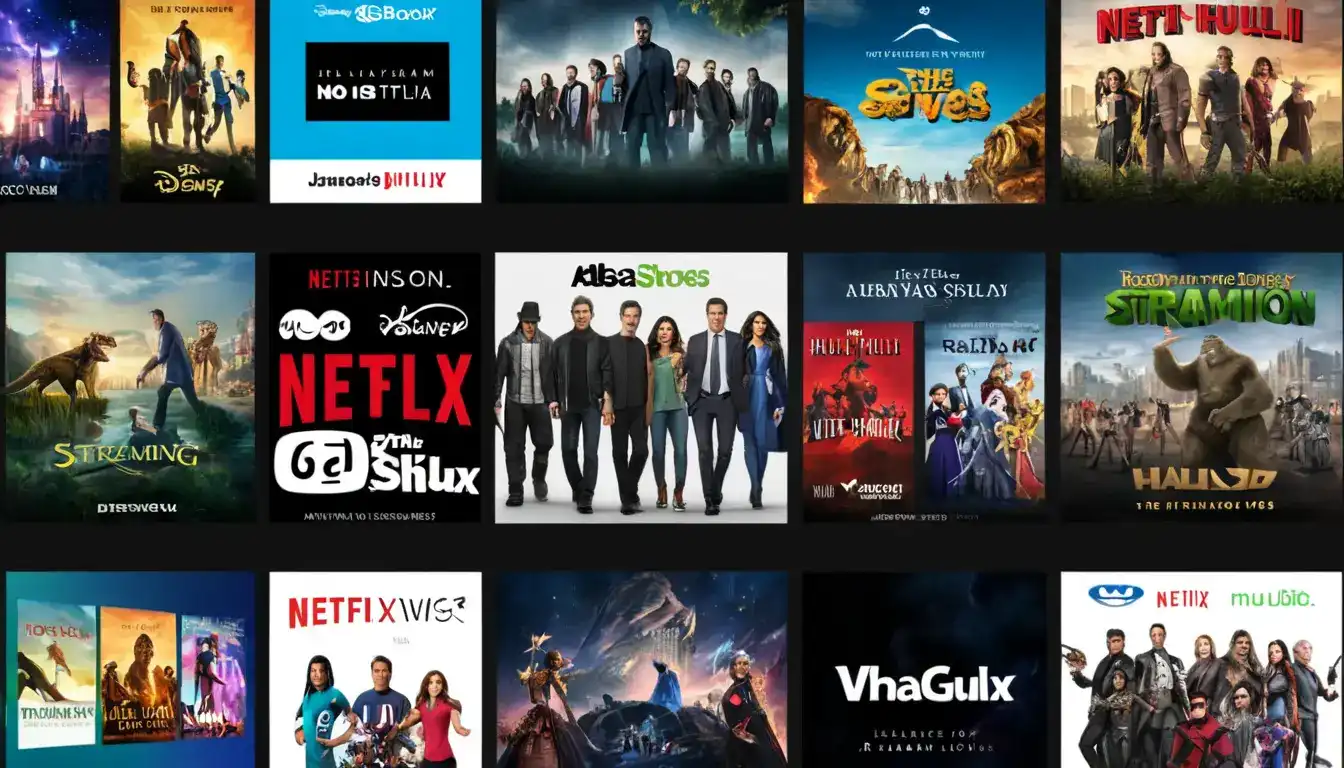Complete Beginner's Guide to Digital Marketing
Emily Willis

Photo: Complete Beginner's Guide to Digital Marketing
Digital marketing has become an indispensable tool for businesses of all sizes to reach their target audience, build brand awareness, and drive sales. If you're new to the world of digital marketing, this comprehensive guide will provide you with a solid foundation to get started.
Understanding Digital Marketing
Digital marketing encompasses a wide range of online strategies and tactics used to promote products or services. It involves leveraging various digital channels to connect with your target audience, build relationships, and drive desired actions.
Key Components of Digital Marketing
- Search Engine Optimization (SEO): SEO involves optimizing your website and content to rank higher in search engine results pages (SERPs). This organic, unpaid method of marketing can drive significant traffic to your website.
- Search Engine Marketing (SEM): SEM involves paid advertising on search engines, such as Google Ads, to appear at the top of search results. This method allows you to reach potential customers quickly.
- Content Marketing: Creating and sharing valuable content attracts and retains customers. This includes blog posts, articles, videos, infographics, and more.
- Social Media Marketing: Utilizing social media platforms to connect with your audience, build brand awareness, and drive engagement.
- Email Marketing: Building and nurturing relationships with customers through email campaigns.
- Pay-Per-Click (PPC) Advertising: Paying for clicks on your ads, typically on search engines or social media platforms.
- Affiliate Marketing: Partnering with other businesses to promote products or services in exchange for a commission.
- Influencer Marketing: Collaborating with influencers to reach a wider audience and build trust.
- Email Marketing Automation: Automating email marketing campaigns to save time and improve efficiency.
Setting Your Digital Marketing Goals
Before diving into specific strategies, it's essential to define your digital marketing goals. What do you want to achieve? Are you looking to increase website traffic, generate leads, boost sales, or enhance brand awareness?
Once you have clear goals, you can develop a targeted strategy to achieve them.
Building a Strong Online Presence
Your website is often the first impression potential customers have of your business. Ensure it's user-friendly, informative, and visually appealing.
- Website Design: Create a website that is easy to navigate and visually pleasing.
- Mobile Optimization: Ensure your website is optimized for mobile devices.
- Call-to-Action (CTA): Include clear and compelling CTAs to guide visitors towards desired actions.
Creating Engaging Content
Content is the cornerstone of successful digital marketing. Create high-quality, relevant, and engaging content that resonates with your target audience.
- Keyword Research: Identify keywords and phrases relevant to your business and target audience.
- Content Creation: Develop a content calendar and create a variety of content formats (blog posts, videos, infographics, etc.).
- Content Distribution: Share your content on social media and other relevant platforms.
Building Relationships with Your Audience
Building strong relationships with your audience is key to long-term success.
- Social Media Engagement: Interact with your followers, respond to comments, and join relevant online communities.
- Email Newsletters: Build an email list and send regular newsletters with valuable content and offers.
- Customer Relationship Management (CRM): Use a CRM system to manage customer interactions and data.
Measuring and Analyzing Your Results
Tracking and analyzing your digital marketing efforts is crucial for measuring success and making data-driven decisions.
- Key Performance Indicators (KPIs): Define relevant KPIs, such as website traffic, conversion rates, and social media engagement.
- Analytics Tools: Use analytics tools to track website performance and user behavior.
- A/B Testing: Experiment with different marketing strategies to optimize results.
Staying Updated with Trends
The digital landscape is constantly evolving. Stay informed about the latest trends, technologies, and best practices.
- Industry News: Follow industry publications and blogs.
- Attend Webinars and Conferences: Learn from experts and network with other marketers.
- Continuous Learning: Stay updated on the latest digital marketing strategies and tools.
Remember, digital marketing is an ongoing process. It requires patience, experimentation, and continuous optimization. By following these guidelines and staying persistent, you can build a strong online presence and achieve your business goals.
we explored the fundamental concepts and key components of digital marketing, providing a solid foundation for beginners to navigate this dynamic field. Now, let's delve into specific strategies and tactics that can help you effectively implement digital marketing for your business.
1. Search Engine Optimization (SEO): Mastering Organic Search
SEO involves optimizing your website and content to rank higher in search engine results pages (SERPs) like Google, Bing, and Yahoo. This organic, unpaid method of marketing can drive significant traffic to your website, attracting potential customers who are actively searching for information or products related to your business.
Key SEO Strategies:
- Keyword Research: Identify relevant keywords and phrases that potential customers are using to search for products or services like yours.
- Content Optimization: Create high-quality, keyword-rich content that is relevant to your target audience.
- On-Page Optimization: Optimize your website's structure, title tags, meta descriptions, and header tags to improve search engine visibility.
- Link Building: Earn backlinks from reputable websites to enhance your website's authority and credibility.
- Technical SEO: Ensure your website is technically sound, with fast loading times, mobile-friendliness, and a secure structure.
2. Search Engine Marketing (SEM): Paid Advertising for Quick Results
SEM involves paid advertising on search engines like Google Ads and Bing Ads to appear at the top of search results. This method allows you to reach potential customers quickly and effectively, targeting specific keywords and demographics.
Key SEM Strategies:
- Campaign Setup: Create targeted advertising campaigns based on relevant keywords, demographics, and interests.
- Ad Copywriting: Craft compelling ad copy that highlights your product or service's benefits and attracts clicks.
- Landing Page Optimization: Ensure your landing pages are optimized for conversions, with clear CTAs and a user-friendly design.
- Budget Management: Set a budget for your campaigns and monitor ad spend to optimize performance.
- Ad Performance Analysis: Track ad clicks, impressions, and conversion rates to measure the effectiveness of your campaigns.
3. Content Marketing: Establishing Thought Leadership and Attracting Customers
Content marketing focuses on creating and sharing valuable, relevant, and consistent content to attract and retain a clearly defined audience—and, ultimately, to drive profitable customer action. By establishing yourself as a thought leader in your industry, you can build trust with potential customers and position your business as the go-to source for information and solutions.
Key Content Marketing Strategies:
- Define Your Content Strategy: Identify your target audience, content goals, and distribution channels.
- Create High-Quality Content: Produce engaging and informative content in various formats, such as blog posts, articles, videos, infographics, and eBooks.
- Content Distribution: Share your content on social media, your website, email newsletters, and relevant online communities.
- Content Promotion: Utilize social media promotion, influencer marketing, and guest blogging to expand your reach.
- Content Analytics: Track content engagement, traffic sources, and conversions to measure content effectiveness.
4. Social Media Marketing: Connecting with Your Audience and Building Brand Awareness
Social media platforms offer a powerful way to connect with your target audience, build brand awareness, and drive engagement. By actively participating in social media conversations, sharing relevant content, and engaging with your followers, you can create a loyal community around your brand.
Key Social Media Marketing Strategies:
- Select the Right Platforms: Identify the social media platforms where your target audience is most active.
- Create Engaging Content: Share a mix of informative, entertaining, and visually appealing content tailored to each platform.
- Interact with Your Audience: Respond to comments, messages, and questions promptly to build relationships.
- Run Social Media Ads: Utilize paid advertising on social media platforms to reach a wider audience and target specific demographics.
- Analyze Social Media Performance: Track social media engagement, follower growth, and website traffic from social media to measure effectiveness.
5. Email Marketing: Nurturing Relationships and Driving Conversions
Email marketing remains a highly effective channel for building customer relationships, nurturing leads, and driving conversions. By segmenting your email list, creating personalized campaigns, and offering valuable content, you can foster strong connections with your subscribers and encourage them to take action.
Key Email Marketing Strategies:
- Build an Email List: Collect email addresses from website visitors, social media followers, and in-person interactions.
- Segment Your Email List: Divide your subscribers into groups based on interests, demographics, or purchase history.
- Create Personalized Emails: Craft personalized email content that addresses specific needs and preferences.
- Automate Email Campaigns: Set up automated email sequences for welcome messages, abandoned cart reminders, and post-purchase follow-ups.
- Track Email Performance: Monitor email open rates, click-through rates, and conversion rates to measure campaign effectiveness.
6. Pay-Per-Click (PPC) Advertising: Driving Targeted Traffic and Conversions
PPC advertising allows you to pay for clicks on your ads, typically displayed on search engines or social media platforms. When someone clicks on your ad, you are charged a fee. This method can be highly effective for driving targeted traffic to your website and generating leads or sales.
Key PPC Advertising Strategies:
- Choose the Right PPC Platform: Select the platform that aligns with your target audience and marketing goals, such as Google Ads, Bing Ads, or social media advertising platforms.
- Keyword Research: Identify relevant keywords and phrases that potential customers are using to search for products or services like yours.
- Ad Creation: Craft compelling ad copy that highlights your product or service's benefits and attracts clicks.
- Landing Page Optimization: Ensure your landing pages are optimized for conversions, with clear CTAs and a user-friendly design.
- Budget Management: Set a budget for your campaigns and monitor ad spend to optimize performance.
- Ad Performance Analysis: Track ad clicks, impressions, and conversion rates to measure the effectiveness of your campaigns.
7. Affiliate Marketing: Leveraging Partner Relationships for Growth
Affiliate marketing involves partnering with other websites or individuals to promote your products or services in exchange for a commission. This method can be a cost-effective way to reach a wider audience and generate new customers.
Key Affiliate Marketing Strategies:
- Find Relevant Affiliates: Identify reputable affiliates who have a strong audience in your niche.
- Create Affiliate Programs: Develop clear terms and conditions for your affiliate program, including commission rates and tracking methods.
- Provide Affiliate Resources: Equip affiliates with marketing materials, product information, and promotional tools.
- Track Affiliate Performance: Monitor affiliate traffic, sales, and commission payouts to measure effectiveness.
- Nurture Affiliate Relationships: Maintain positive relationships with your affiliates to encourage ongoing promotion.
8. Influencer Marketing: Collaborating with Industry Thought Leaders
Influencer marketing involves partnering with influential individuals in your industry to promote your products or services to their followers. This method can be highly effective for reaching a targeted audience, building brand awareness, and enhancing your brand's credibility.
Key Influencer Marketing Strategies:
- Identify Relevant Influencers: Find influencers who align with your brand values, target audience, and industry expertise.
- Develop Authentic Partnerships: Establish genuine relationships with influencers, ensuring they believe in your product or service.
- Create Collaborative Campaigns: Work with influencers to develop creative and engaging campaigns that resonate with their audience.
- Track Campaign Performance: Monitor influencer engagement, reach, and conversions to measure campaign effectiveness.
- Maintain Influencer Relationships: Nurture long-term relationships with influencers for ongoing collaborations.
9. Email Marketing Automation: Saving Time and Improving Efficiency
Email marketing automation involves using software to automate email campaigns, such as welcome messages, abandoned cart reminders, and post-purchase follow-ups. This can save you time, improve efficiency, and personalize your email marketing efforts.
Key Email Marketing Automation Strategies:
- Choose an Email Automation Platform: Select an email automation platform that integrates with your email marketing software and CRM system.
- Map Out Customer Journeys: Create customer journey maps to identify automation opportunities throughout the customer lifecycle.
- Set Up Automated Email Campaigns: Design and schedule automated email campaigns for various scenarios.
- Personalize Automated Emails: Utilize customer data to personalize automated emails with relevant content and offers.
- Monitor and Optimize Automated Campaigns: Track the performance of automated campaigns and make adjustments as needed.
10. Measuring and Analyzing Your Digital Marketing Efforts
Tracking and analyzing your digital marketing efforts is crucial for measuring success and making data-driven decisions. By understanding which strategies are working and which ones need improvement, you can optimize your campaigns and achieve your marketing goals.
Key Analytics Tools:
- Google Analytics: A comprehensive analytics tool that provides insights into website traffic, user behavior, and marketing campaign performance.
- Social Media Analytics Platforms: Native analytics tools offered by social media platforms, such as Facebook Insights and Twitter Analytics, provide data on social media engagement and audience demographics.
- Email Marketing Analytics Tools: Email marketing software typically includes built-in analytics tools to track email open rates, click-through rates, and conversion rates.
- Marketing Automation Analytics: Email automation platforms often provide analytics dashboards to track the performance of automated campaigns.
Conclusion:
Digital marketing offers a vast array of opportunities for businesses to connect with their target audience, build brand awareness, and drive sales. By embracing a customer-centric approach, leveraging data and analytics, staying updated with trends, and committing to continuous learning, you can navigate the dynamic world of digital marketing and achieve sustainable growth for your business.
Remember, digital marketing is a journey, not a destination. Enjoy the process, embrace challenges, and celebrate your successes along the way.
Latest ✨
View AllDiscover the essential qualities required to become a successful leader, from integrity and empathy to communication and adaptability. Learn how to develop these traits to inspire and motivate your team
Emily Willis
top digital marketing trends for 2024, including the rise of AI, the importance of user experience, video marketing dominance, influencer marketing, privacy and data security, sustainability and ethical marketing, and emerging trends like AR/VR, metaverse marketing, blockchain, and NFTs. Specific strategies are provided for leveraging AI for personalized customer experiences, enhancing user experience for mobile users, creating engaging video content, building authentic influencer partnerships, prioritizing data privacy and security, integrating sustainability and ethical practices.
Emily Willis
Europe is full of rich culture, with ten cities offering enriching cultural experiences. From the romance of Paris to the splendor of Rome and the artistic flair of Barcelona, each city has its own unique charm and heritage.
Emily Willis
Proper nutrition is essential for optimal brain function during exams. Foods rich in complex carbohydrates, lean protein, healthy fats, and hydration can help maintain energy levels and focus. Smart snack options during exams include fresh fruits, vegetables with hummus, trail mix, yogurt with granola, and dark chocolate.
Emily Willis
Business
View All
August 4, 2024
Building a Consistent and Inspiring Personal Brand Through Online PlatformsIn today's digital age, it is important to establish a strong personal brand in order to stand out in a competitive landscape. This can be done by following practical steps such as defining your brand identity, identifying your target audience, creating a compelling online presence, crafting quality content, engaging with your audience, leveraging social media effectively, networking and collaborating, monitoring and adapting, showcasing your authenticity, and seeking professional guidance if needed. Building a personal brand requires dedication, authenticity, and strategic planning, but it can lead to a memorable and influential brand that resonates with others in the digital world.
Emily Willis

August 4, 2024
Strategies for Effective Business Growth in a Competitive Marketimportance of strategic planning, innovation, and understanding market dynamics for businesses to achieve sustainable growth in a competitive market. It covers strategies such as customer focus, innovation, marketing, partnerships, financial management, technology, employee engagement, and sustainability.
Emily Willis

August 5, 2024
Tips for Choosing the Right Investment Product for Your Needsprovides guidance on investing money, starting with understanding financial goals and risk tolerance. It explains different investment options such as stocks, bonds, mutual funds, ETFs, real estate, and retirement accounts, and emphasizes the importance of diversification.
Emily Willis
Economy
View Allimpact of inflation on households and businesses, outlining the causes and consequences of rising prices. It provides strategies for both households and businesses to cope with inflation, such as budgeting, seeking deals, and negotiating with suppliers. The importance of collaboration and communication between governments, businesses, and consumers is emphasized, along with the need for long-term investments in infrastructure, skills development, and sustainable practices.
Read MoreGlobalization has a profound impact on the economies of developing countries, offering both opportunities and challenges. By increasing access to markets, facilitating technology transfer, creating jobs, and promoting cultural exchange, globalization can drive economic growth and development. However, addressing the challenges of economic inequality, loss of domestic industries, environmental impact, and cultural homogenization is essential to ensure sustainable and inclusive growth. By adopting strategic measures and fostering international cooperation, developing countries can maximize the benefits of globalization and build a brighter future
Read MoreThe digital economy has the potential to bring economic growth and innovation to developing countries, but there are several challenges that need to be addressed. These challenges include inadequate digital infrastructure, a digital divide that exacerbates inequalities, complex and outdated regulatory frameworks, cybersecurity risks, and limited access to financial services. However, there are opportunities for enhancing financial inclusion and economic growth. These opportunities include mobile and digital payments, implementing digital identification systems, e-commerce and market access, digital skills development, and public-private partnerships. By addressing these challenges and embracing the digital revolution, developing countries can unlock new opportunities for economic empowerment and inclusive growth.
Read MoreEntertainment
View All
August 5, 2024
Entertainment in Society: Social Impact, Cultural Influence, Economic ContributionsEntertainment is more than just a way to pass the time it has a significant impact on society, culture, and the economy. It promotes empathy, sparks conversations, and drives social change. It reflects and shapes cultural trends, while also preserving traditions. The entertainment industry generates jobs, contributes to economic growth, and drives technological innovation.
Emily Willis

August 4, 2024
Virtual Music Concerts: The Future of Live Performance?The music industry has seen significant changes in recent years, with virtual music concerts becoming a popular trend, especially due to the impact of the COVID-19 pandemic. Technological advancements have made virtual concerts more accessible and cost-effective, while also reducing the environmental impact of live events. However, challenges such as technical issues and the lack of physical presence remain. The future of virtual concerts may involve hybrid models that combine virtual and physical experiences, as well as continued technological innovation to enhance the quality of virtual performances. Building a sense of community and engagement will also be crucial for the success of virtual concerts moving forward.
Emily Willis

August 4, 2024
The Evolution of Streaming Services Such as Netflix, Disney+, Hulu, and the Implications for the Traditional Entertainment IndustryThe rise of streaming services has revolutionized the entertainment industry, offering on-demand access to a vast library of content through internet-connected devices. Platforms like Netflix, Disney+, and Hulu have diversified their content libraries, reshaped consumer behavior, and challenged traditional distribution models. Technological advancements have enhanced streaming experiences, while economic and cultural implications have led to global market expansion and increased investment in original content production. The future of the streaming industry will be shaped by competition, convergence of media and technology, and the need for adaptation to changing consumer preferences. Embracing digital transformation and strategic partnerships will be crucial for stakeholders in navigating the evolving landscape of modern entertainment.
Emily Willis
Health
View Allmaintaining good health and well-being through nutritional choices. A balanced diet, incorporating whole foods, staying hydrated, consuming nutrient-dense foods, managing portion sizes, practicing mindful eating, eating regular meals and snacks, considering supplements, and adopting sustainable eating practices are all highlighted as effective strategies for enhancing overall.
Emily Willis
Preventive healthcare focuses on strategies to prevent disease and maintain well-being, rather than just treating illnesses after they arise. It helps identify risk factors early on, allowing for interventions that can prevent or delay the onset of chronic diseases.
Emily Willis
significance of mental health awareness in today's fast-paced world. It discusses the importance of understanding mental health, breaking down stigma, and promoting positive mental health practices.
Emily Willis
Trending 🔥
View All
1
2
3
4
5
6
7
8
10
Lifestyle


Sports
View AllAugust 5, 2024
Sports for Social Good: Promoting Diversity, Inclusion, and Community Engagement
Read MoreTechnology
View All
August 5, 2024
Top Unity Software Development Trends to Watch in 2024
Explore the top Unity software development trends that will shape the gaming industry in 2024. From AI integration to VR/AR immersion, cross-platform reach, cloud collaboration, and mobile gaming, Unity is revolutionizing gaming experiences. Stay ahead in the dynamic world of game development with these insights.

August 4, 2024
Amidst Economic Uncertainty, Businesses Adapt and Innovate for Survival
The business world can be unpredictable, but companies can thrive by embracing adaptation and innovation. Understanding market trends, economic indicators, and global factors is crucial for charting a successful course.

August 5, 2024
The Future of Blockchain and Its Impact on Society
Blockchain technology, originally developed for cryptocurrencies like Bitcoin, has evolved into a versatile tool with the potential to revolutionize various industries beyond finance. Its decentralized and transparent nature offers solutions to challenges faced by societies worldwide. Blockchain's impact on society is poised to be transformative across multiple domains, including enhanced security, data integrity, decentralization, supply chain transparency, digital identity, and financial inclusion.

August 5, 2024
Oculus Quest 2 vs HTC Vive Pro – Which Should You Choose?
Oculus Quest 2 vs HTC Vive Pro – which VR headset reigns supreme? Dive into this ultimate showdown to discover the strengths and weaknesses of each, and decide which one is worth your investment. From specs and comfort to content and price, we'll help you make an informed choice.



















